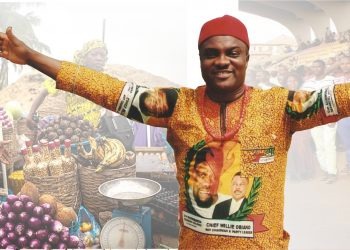Governance is structure and design put in place for transparency, accountability and orderliness in a sane society. It is what differentiates sanity and chaos. Even though it requires a lot of discipline, successful societies round the world show that it isn’t rocket science. Coming home, Anambra that was a shining light circa 2014 became a study on how not to run a society under the immediate past administration. Mountain of debts, insecurity, neglected and decayed infrastructure, multiple taxation, elevation of charlatanism and sycophancy as statecraft, primitive accumulation of state resources and near absence of governance became our story. It is a known fact that Obiano failed as the fifth elected governor of Anambra state judging from where he met the state and at the point he handed over. Obiano failed but there are people and groups that enabled his failure.
THE CHURCH: It is God’s will that we live in an organized and functional society. Christ himself admonished his people to give to Caesar what belongs to Caesar and to God what belongs to God. The Church should be the conscience of the society. The fact that the authority of the church is well respected confers on them the responsibility to guide and give direction to the leaders. Unfortunately, in Obiano’s case, the church looked the other side. No highly ranked religious leader was seen publicly criticizing Obiano’s bad governance; rather they were working in cahoots with him, granting him their platforms for further whitewashing about his phantom projects and vainglory, handing him tons of awards for “good governance” and even recommending some of members of their congregation for political appointments. They feathered their nests at the cost of the betterment of their flocks. Instances abound in history where the priestly class led revolution to correct the ills of their society. Rev. Fr. Gapon of the dark days of Russia was a clear example of the role priests can play in making a government sit up.
PDP: Power corrupts even the best of men. No government succeeds anywhere in the world without effective opposition. In Britain, opposition is called ‘the shadow government’. They are institutionalized and always there to put the government in power in-check and form government when it is glaring that government in power has failed. They keep the government in power on their toes; in fact, they are the mirror through which the government in power sees the society. PDP has been the main opposition in Anambra state but instead of living up to expectations, the party has continued to behave like an extension of APGA. When things were so bad, there were neither press releases from PDP nor any serious criticism from them. There were allegations that the PDP top brass in the State were begging for crumbs at the Governor’s table. Their brand of opposition is transactional. Obiano wouldn’t have performed so badly if PDP was on top of their game. Unfortunately, the party is riddled with infighting, and most of their members were just power mongers who do not understand the responsibility that comes with wielding power.
ANAMBRA ELITES: The elites of any society control politics. That is why in United States, Britain, and other matured democracies, political narratives that shape the society flow from the elites to the commoners in the society. That is the main reason for the popular Electoral College in United State because it is believed that in any society, elites are the ones who, having conquered the hierarchy of needs and are at the top of the food chain, think for the future and understand the nuances of real development. But on the contrary, when it was obvious that Anambra was no longer safe in the hands of Willie Obiano, some Anambra elites in a desperate and short sighted bid to be relevant to the seat of power, spent their resources to get him reelected. Most of these elites are community PGs, traditional rulers, top business executives, bankers, who were sleeping and waking up at Governor’s lodge and even smiling to the bank when the state was burning. They didn’t realize that in the words of JP Clark, we are all casualties, and that the system is intertwined. If someone somewhere in the state is not safe, then nobody is safe.
STATE HOUSE OF ASSEMBLY: It was Baron De Montesquie who propounded the doctrine of separation of powers to preserve individual liberty and check tyranny. The legislative arm of government is equipped with powers to checkmate the excesses of the executive. Under Obiano, the State legislature became an appendage of the executive, a mere rubber-stamp. Debates on critical issues affecting the State were almost nonexistent. The members became paper tigers, toy soldiers. They neither barked nor bit. The State was on auto pilot and the legislative arm was dozing, drunk on filthy lucre that was their perfect tranquilizer. Rather than scrutinizing the state budget properly, they were parties to budget padding. Every financial proposal of the executive was signed off without any scrutiny. None of the groups already mentioned had the constitutional ability to check the excess of the executive except the legislature. Essentially, they enabled the ruin of Anambra’s patrimony and gave it a legal cover. The tragedy is that the present administration inherited the same compromised legislature, and a leopard never changes its spots.
NDI ANAMBRA: In a democracy, the people are the sovereign and the real power lies with them. They only donate those powers willingly to a sovereign to hold in trust. Being a citizen comes with rights and responsibilities. It is those responsibilities that preserve the rights and individual liberties. When the citizens shirk away from the responsibilities, there is a danger of losing those rights. At the peak of gross mis-governance and monumental incompetence that greeted Obiano’s administration, Ndi Anambra were lax in their civic duties. Governance took a flight and it was clear that the State was headed to the precipice. The entire State was a huge mountain of refuse. Roads became dilapidated. Security was a forgotten duty. Businesses fled the State. Unemployment worsened. Despite the multiple taxation that engendered hostile business environment, people paid without any whiff of resistance. The Governor continued to live like an emperor, oblivious of the deluge of challenges the people are faced with on a daily. In developed countries, when government marshals out punitive policies against the people, heavy protests follows making government to rescind their decision. But in our case, we abdicated our responsibilities and secretly hoped that God will intervene. But societies are not built that way. Functional societies are built by conscientious citizens who understand that they are the sovereign and are alive to their responsibilities.
When our people experience a calamity and survive it, they say “ozoemena”. (May another calamity not befall us). Obiano’s misrule was a calamity. May we not experience another, even as we buckle up to our responsibilities.







Amen,
You said it all , let ndi Anambra borrow common sense. Individualism can never give us progress .
It’s unfortunate situation.
But the blame goes not only to the above mentioned groups, but also to generally of Anambralians , including you and me-the intellectuals and professionals.
We are too lazy to analyse issues s, make constructive comments on how best to deliver quality services and, produbcts and improvements in
State.
Same in communities, where the traditional rulers and PGs behave like Collossus.
It is time for educated in the State, and towns open their eyes, educate the masses to vote in in only people of character, who are humble.
We can be part of the change team.